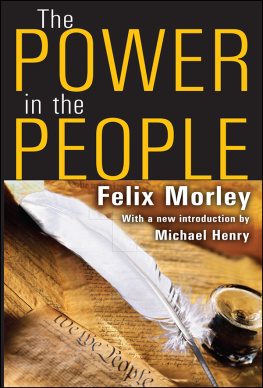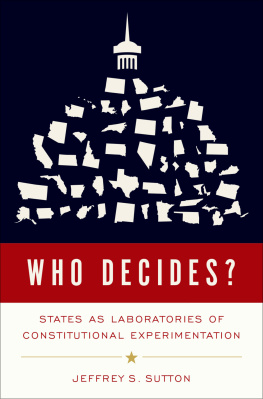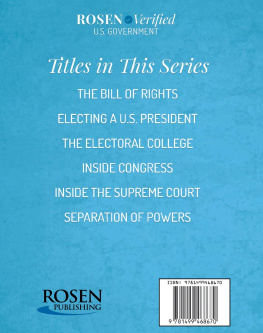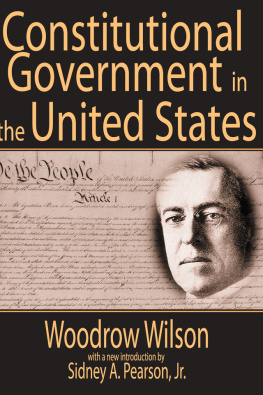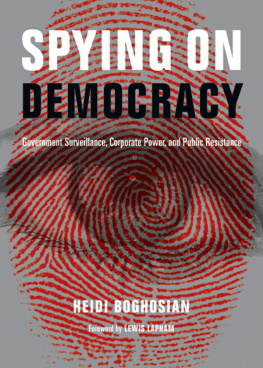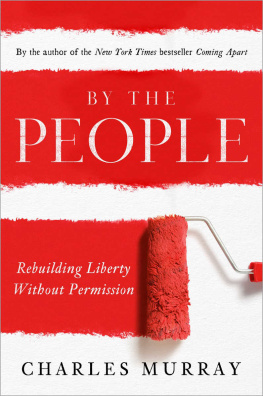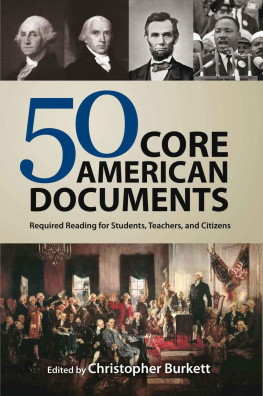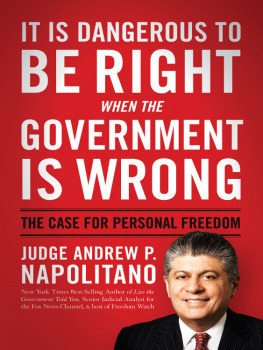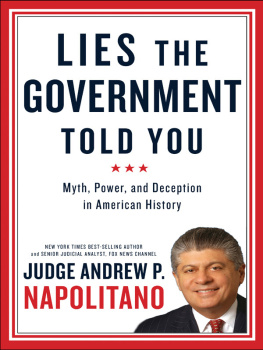Originally published in 1972 by Felix Morley
Published 2010 by Transaction Publishers
Published 2017 by Routledge
2 Park Square, Milton Park, Abingdon, Oxon OX14 4RN
711 Third Avenue, New York, NY 10017, USA
Routledge is an imprint of the Taylor & Francis Group, an informa business
Copyright 2010 by Taylor & Francis.
All rights reserved. No part of this book may be reprinted or reproduced or utilised in any form or by any electronic, mechanical, or other means, now known or hereafter invented, including photocopying and recording, or in any information storage or retrieval system, without permission in writing from the publishers.
Notice:
Product or corporate names may be trademarks or registered trademarks, and are used only for identification and explanation without intent to infringe.
Library of Congress Catalog Number: 2010001593
Library of Congress Cataloging-in-Publication Data
Morley, Felix M. (Felix Muskett), 1894-1982.
The power in the people / Felix Morley.
p. cm.
Originally published: Los Angeles : Nash Pub., 1972.
Includes bibliographical references and index.
ISBN 978-1-4128-1342-6 (alk. paper)
1. Constitutional history--United States. 2. United States--Civi-
lization. 3. Political scienceUnited States--History. I. Title.
JK31.M64 2010
320.973--dc22
2010001593
ISBN 13: 978-1-4128-1342-6 (pbk)
T HIS BOOK IS DEDICATED
TO THE MEMORY OF
J AMES M ADISON
In grasping for the shadow of democracy we are losing the substance of self-government.
Felix Morley
Felix Morley, who died in 1982, would have been thoroughly dismayed but not at all surprised by the government-expanding consequences of the 2008 election because this is precisely what he devoted most of his eighty-eight years to analyzing, to predicting, and, as much as possible, to resisting. Indeed, it would be no exaggeration to say that he thought of himself as a combatant in a long-running civil war between advocates of centralized State power and advocates of individual freedom, a struggle that he believed had significantly accelerated and intensified in his lifetime.
One of the major contributors to the Libertarian branch of the Conservative movement in the mid-twentieth century, Morley was born in 1894 in Bryn Mawr, Pennsylvania as the second son of immigrant Quaker parents. His father Frank taught mathematics at the Quaker institution of Haverford College until 1900, when he became the chair of the mathematics department at Johns Hopkins University in Baltimore. This move was fortuitous, because it made it easy for Morley to be present at the 1912 Democratic convention in Baltimore that nominated the Progressive Woodrow Wilson on the forty-sixth ballot, the occasion on which, as Morley recalled more than sixty years later, the virus of American politics entered [his] bloodstream. It was to prove a permanent infection.
Because Morley wanted to understand the world as much as possible he devoted considerable time to living, working, and traveling in Europe, as well as other parts of the world, particularly during his twenties. After graduating from Haverford College and studying at Oxford as a Rhodes Scholar (an honor he shared with both of his brothers, Frank and Christopher), he launched his professional journalism career in 1922 when he became an editorial writer for the Baltimore Sun. Three years later he was offered an assignment in China that afforded him an opportunity to travel in Asia. Some time after his return to Baltimore he decided that he wanted a truly international listening post. He went to Geneva on a Guggenheim Fellowship to write a thorough study of the League of Nations, which was published in 1932 by The Brookings Institution (which also gave him a Ph.D.) as The Society of Nations: Its Organization and Constitutional Development. The following year he was offered the editorship of the Washington Post by Eugene Meyer, who had bought it with the intention of elevating it from a local city newspaper to one of national significance. This perfectly suited Morleys own editorial policy, which was to make the paper something of an American version of the famous Manchester Guardian. That is to say, its outlook should be international; its philosophy independent and liberal in the classical sense of the word; its foreign correspondence informative and impartial; its editorials well reasoned, well written and forceful; its adherence to strictly Constitutional government unquestionable. Adherence to the Constitution would be one of his lifelong concerns.
Early in 1940 he was offered the presidency of Haverford College, and although he was reluctant to leave the Washington Post at a time when it looked as though the United States would be drawn into World War II, he decided to accept the offer. However, given his commitment to the good of his country, this hardly represented a withdrawal into private life. Since he had been born and reared in the Quaker tradition Morley most likely had a predisposition toward a more pacifist, isolationist foreign policy, but his reasons for opposition to war in general seemed to be rooted primarily in a concern for wars harmful effects on American freedom rather than in purely pacifist principles, and he did not think that the United States could accomplish anything constructive by entering yet another European war (after the hideous blunder of World War I). However, despite his non-interventionist position and the pacifist views at the college, after Pearl Harbor Morley realized that Haverford could not successfully oppose the authoritarian pressures which protracted hostilities foreshadowed but must cooperate in what would undoubtedly be a totalitarian effort, and he pursued policies and established programs that enabled the College to survive the inevitable drop in enrollment and made the Colleges contribution to the war effort as constructive as possible.
By the end of 1943 he had put Haverford College on a sound financial footing and was considering other options. Although he remained as president for two more years, he also joined with Frank Hanighen and William Henry Chamberlin in the launching of the (initially) weekly journal Human Events early in 1944, with Morley providing editorial supervision and a third of the analytical essays, and leaving everything else in the hands of Hanighen. The name Human Events was taken from the opening sentence of the Declaration of Independence which asserts that it was proper for the American people to assume among the powers of the eartha separate and equal station, and reflected Morleys admitted greater interest in human events than in human beings. He wrote later that his ambition was that Human Events should serve as a vehicle to help restore the vitality of American political thinking and to promote a durable peace.
In his prospectus for Human Events, dated January 1, 1944, Morley informed potential subscribers that the publication would examine and interpret those international developments which, while wholly beyond the control of our own electorate, are nevertheless holding the future of this Republic and of all its citizens. The two catastrophic World Wars had, he believed, distort[ed] and impoverished] our national life without creating an effective world community and had also created the twin dangers of tyranny, a domestic counterpart of National Socialism, through the substantial growth of government power that diminished both individual freedom and the vitality of local government, and a trend toward military alliances that would reduce Americas independence and freedom of action as a nation. He feared the development of American imperialism, something he considered incompatible with the countrys federal system of government, and thought that the only isolationism to be truly concerned about was the increasing disregard of that political philosophy which prompted the establishment and insured the development of this Nation. Looking ahead to the postwar world, Morley believed that

